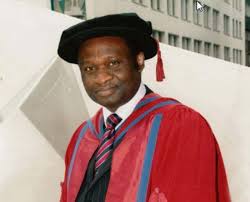By Olu Fasan
Last week, government rolled out the drums to celebrate Nigeria’s 60th Independence Day. But across the South, separatist groupswere beatingthe drumsof secession. In the South West, Yoruba One Voice, YOV, a group calling for “Oduduwa Republic”, held rallies across Yorubaland and hoisted a flag of the “republic” in some towns. In the South East, the Indigenous Peoples of Biafra, IPOB, which has long agitated for the “Republic of Biafra”, issued a sit-at-home order widely obeyed across Igboland. Let’s be clear. Those advocating secession are on the fringes of public discourse and advocacy on the future of Nigeria.Those of us in the mainstream of that discourse and advocacy simply call for restructuring Nigeria to unleash the peaceful coexistence, unity, stability and progress that are so elusive in this country.

That said, separatism is rooted in deep feelings and must be handled tactfully. Governments that respond belligerently to separatist agitations, threatening fire and brimstone, always end up stoking the embers. Unfortunately, that’s President Muhammadu Buhari’s reflex response to such agitations. In 2017, he sent soldiers to suppress separatist protests in the South East. In that year’s Independence Day broadcast, Buhari said: “We cannot and will not allow such advocacy.” He said those who “dare to question” the collective existence of Nigeria “crossed our national red lines”; andordered the military to “fight and destroy them relentlessly”. Earlier this week, President Buhari’s response was typically obdurate and belligerent when prominent Nigerians, including highly respected religious leaders, said that Nigeria must be restructured or “the country will break up.” He described the calls as “unpatriotic outbursts” and said he would not succumb to pressure to restructure Nigeria. Of course, restructuring Nigeria has never been on Buhari’s radar. He described the National Conference organised by President Goodluck Jonathan’s administration as one example of “how we don’t get our priorities right in this country”.
In 2018, he said: “There are too many people talking lazily about restructuring in Nigeria”. Truth is, Buhari has no truck with those advocating restructuring and absolutely no tolerance for those agitating for self-determination. “We shall tackle them all,” he vowed in 2017! In an article titled “Separatism in Nigeria: Buhari must avoid the Spanish response” (BusinessDay, October 9, 2017),I argued that the “Operation Phyton Dance” military clampdown on separatist agitations in the South East bore similarities with the Spanish government’s brutal responseto the Catalonians’ independence referendum. The Spanish Ambassador to Nigeria was angry that I compared his country to Nigeria, and personally wrote a rejoinder to the newspaper.
But my point remains valid. Civilised countries don’t respond to agitations for self-determination with military actions. Self-determination is about human freedom, and you cannot kill it off with force. As Wolgang Danspeckgruber, Director of the Liechtenstein Institute on Self-Determination at Princeton University, said: “No other concept is as powerful, visceral, emotional, unruly, as steep in creating aspirations and hope as self-determination.” Self-determination is a fundamental right under international law, and UN Conventions impose a duty on states to refrain from any forcible action calculated to deprive a people of the right. Many countries, such as the UK, Canada and Switzerland allow secession, subject to a referendum; there have been unsuccessful independence referendums in the UK and Canada. But some countries, such as China and Spain, have anti-secession clauses in their constitution. Indeed, the 1978 Spanish constitution refers to the “indissoluble unity” of the Spanish nation. This is the language that President Buhari and his government often use: “Nigeria’s unity is indissoluble” or “Nigeria’s unity is non-negotiable”.
But once the government of a multi-ethnic, tension-prone country declares that the country’s unity is indissoluble, then it has two options. The first is to negotiate a political and constitutional settlement that allows every ethnic group to have a sense of belonging and feel happy to remain in the union. The second option, absent the first, is to enforce the “non-negotiable” unity through military suppression. Surely, the only way you can maintain unity in a multi-ethnic country without agreement is by use of force. But if a country must be kept together by use or threat of force, it will forever remain tension-prone and unstable, and, thus, unable to make genuine progress. Last week, Channel TV interviewed General Ibrahim Babangida, former military president, and asked him: “What has been Nigeria’s most important achievement in the last 60 years?” Without much hesitation, Babangida responded: “The fact that we are able to remain one as a country, I think this is our greatest achievement.”
But if Nigeria’s greatest achievement since independence, 60 years ago,is that it is still one country, doesn’t that tell us that this country’s unity is threadbare and tenuous? And should we take that fragile unity for granted? In his book, Because I Am Involved, the late Biafran leader, Emeka Odumegwu-Ojukwu described two types of unity. The first is “the unity of Jonas inside the belly of the whale”, the second is “the unity of marriage”. He concluded: “The unity we seek is the latter”. But “the unity of marriage” comes through agreement. As the Bible says in Amos 3:3, “Can two walk together, except they be agree?” Sadly, there is no such agreement among Nigeria’s ethnic nationalities; and without unity of purpose, they can’t “walk together”.
So, Nigeria must be restructured to create an enduring political settlement. Without that, this country will always struggle “to remain one” and could fracture! Yet, President Buhari believes Nigeria can be kept together forcibly. In 2017, he said that if Nigeria broke up under him, “nobody will take another general to lead his country”. So, he sees keeping Nigeria together in militaristic terms, hence he threatened to “fight and destroy” separatist agitations “relentlessly”. But if Nigeria must have genuine unity that begets progress, it must be kept together by agreement, not force. Nigeria needs a negotiated political settlement; it needs restructuring. That’s the voice of reason. Buhari must heed it!

